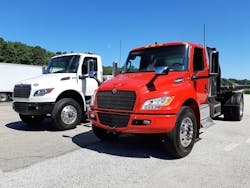Vocational truck market set from stronger 2024: Paccar, Traton
Paccar leaders told analysts and investors that they expect the Class 8 market in the United States and Canada to shrink about 8% next year. Their peers at Traton SE, which owns Navistar, said they have a similar outlook—although both executive teams said other segments of the market, such as vocational and medium-duty trucks, appear set for a stronger 2024.
Paccar, parent of Peterbilt and Kenworth, reported record profits in the third quarter—more than $1.2 billion, a 60% jump from the same period last year—but noted the sales drop as fleets start to look to 2027 emission standards. Both companies’ leaders said the supply chain continues to deliver some headaches.
Traton reported Q3 net income of right around $1 billion, with the company’s profit margin climbing more than three percentage points year over year. Big fleets, said CEO Christian Levin, are showing no signs of backing away from their order pace.
Read also: Kenworth service truck set for serious tasks
“On top of that, with all the construction initiatives now happening as a result of the IRA (Inflation Reduction Act), there is massive investment into…the construction material business,” Levin said. “So I’m looking very positively to development in the U.S.”
Navistar sold 22,385 trucks and buses during the third quarter, down a tick from a year earlier, and grew operating profits nearly 15% to about $213 million even though sales slipped 7%. The division’s incoming orders fell 30% to 16,400 versus the summer of 2022, however, a number that Levin qualified by pointing to an order book that is “full up until summer.”
Levin added that a reason order books are still full is that Traton’s global supply chains are still struggling with “regular” bottlenecks. He singled out the company’s U.S. operations as “extremely stretched” and thus limited in their capacity to supply finished vehicles to customers. Ironing out the wrinkles at Navistar and some of Traton’s other brands is a high priority, he said.
“This is now our challenge here for the coming six months,” Levin said. “We have stabilized production; now we need also to stabilize the delivery.”
Paccar sold 50,100 trucks in the three months ended Sept. 30, an increase from 44,400 in the prior-year period. (Total revenues from trucks and parts topped $8.2 billion versus about $6.7 billion in Q3 of 2022.) Of that number, U.S. and Canadian customers bought 27,500 trucks, up from 24,400. Harrie Schippers, president/CFO, said his team expects that number to be between 48,000 and 51,000 in the current quarter.
Read also: International eMV drives like a diesel
For all of 2023, Paccar’s executives expect U.S. and Canadian Class 8 sales total between 295,000 and 315,000. For next year, however, they are forecasting a range of 260,000 to 300,000 vehicles. In Europe, they are looking for total sales in the 16-tonne segment to slide about 12% to a range of 260,000 to 300,000 trucks. Figuring into those projections are both a general normalization of demand—fleets are still looking to replace equipment but are also dealing with rising interest rates and other macroeconomic factors—and tighter emissions standards from the Environmental Protection Agency that will kick in with model-year-2027 trucks.
“People are trying to figure out how to think about the next three years,” Paccar CEO Preston Feight said on a conference call when asked about managing “the growth air pocket” next year. “We just feel like we’ll see some adjustments there from this year but that it should still stay at like a replacement demand level.”
Schippers wasn’t as urgent in describing the supply chain situation, which he said is improving. But he did note that production levels remain limited by the troubles that are persisting.
About the Author
Geert De Lombaerde
A native of Belgium, Geert De Lombaerde has more than two decades of business journalism experience and writes about markets and economic trends for Endeavor Business Media publications, including IndustryWeek and FleetOwner. With a degree in journalism from the University of Missouri, he began his reporting career at the Business Courier in Cincinnati and later was managing editor and editor of the Nashville Business Journal. Most recently, he oversaw the online and print products of the Nashville Post and reported primarily on Middle Tennessee’s finance sector as well as many of its publicly traded companies.
